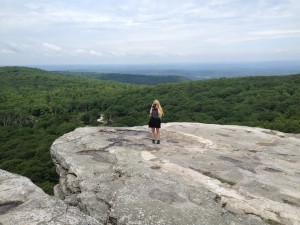Our Fears Can Stifle Our Children’s Exploration and Learning
Last month we dove into the “cons” of unschooling, basically some of the reasons why an unschooling lifestyle might not be a good fit for a family.
This month, let’s assume the fit looks good and take the next step: deschooling in earnest. What are some of the challenges we may encounter? The conventional ideas we may need to question before we can fully embrace the unschooling lifestyle with our children?
 Lissy exploring Sam’s Point, NY
Lissy exploring Sam’s Point, NYOver the years, one of the things I’ve seen regularly interfere with the transition to unschooling is fear. It can pop up all over the place. Often it shows up when we approach the edges of our comfort zones—that’s the point, to warn us that danger may be approaching. But by whose definition of danger? That’s the big question we’ll be asking ourselves again and again.
The conventional expectation is that it’s a parent’s job to tell their children what they can and can’t do. And it can be tempting to use our fear to guide our children’s actions.
Yet our children are not us. They will have their own comfort zones. And exploring and discovering where their comfort zones lie is a important piece of not only exploring their interests, but also exploring themselves and developing a solid sense of self-awareness.
Exploring Their Outer World
If we perpetuate our fears by instilling them in our children, we may well end up stifling their curiosity and exploration of the world. How? Well, imagine they have an interest that makes us uncomfortable—that we fear isn’t “worthy.” Our fear may shine through, if not our words, our attitude and actions. For example, we show our judgment when they want to share their excitement and we act too busy to join them. And we reinforce the message when we make time for an interest that we “approve of.” They’ll eventually get our message, and their fascination with the interest we fear will likely fade.
Not only do they lose out on the experience and knowledge they may have gained pursuing that interest, if this happens a few times, they may come to believe that the things they find interesting aren’t considered “worthy.” They come to believe their parents are better judges of the world than they are, and they lose trust in themselves. They stop diving into things that catch their attention, they stop asking questions, and they start waiting until they are told which things to pursue.
And their curiosity about the world fades.
Exploring Their Inner World
With unschooling, we try not to overpower our children with our fears because we see how it directly interferes with their exploration and learning. And that goes for their inner world as well. If they don’t have the space—or even better, the active support—to explore not only their interests, but also their own comfort zones growing up, they will need to figure this out at some point as adults.
Some take this time as young adults going off to find themselves. Others hold on tighter to the expectations placed on them, though eventually it can play out as a mid-life crisis. This drive to understand ourselves is not self-indulgent, it is a human need.
And I don’t want to give the impression that unschooled young adults “have it all figured out.” What they do have is a reasonably solid understanding of themselves and they are experienced with navigating these kinds of challenges. Granted, it’s not always pleasant, but they don’t usually get thrown for long, because they are experienced at finding their way to the other side.
So, if we’re going to help our children explore and learn about themselves, we need to do the work to understand ourselves well enough that we don’t inadvertently make the process more difficult by imposing our fears onto their lives.
Doing Our Work
When fears arise—and they will—it’s what we do with them that matters. We aren’t trying to avoid or ignore them; we want to process and learn from them. Are you prone to a deer-in-the-headlights reaction, frozen where you are, unable to think? If so, the first question is how can you move through that rush of adrenaline to gather information about the situation and begin to see some of the choices available to you? Try things out and see what helps in the moment. And remember, most situations, although they trigger fear, do not need an immediate reaction. And choices made in the throes of fear usually aren’t usually our best because we’re often suffering from tunnel vision.
To look at processing our fears, let’s go back to our comfort zones. Remember the important question I mentioned earlier? Whose definition of danger we were using that triggered our fear reaction? It can definitely be challenging to tease out which are part of our personal makeup, and which are learned behaviours that we don’t actually agree with.
For a moment, think about life at the edge of one of your comfort zones. Can you feel yourself tensing up? That’s fear. What is it that are you fearful of? Do you find yourself at the edge of your knowledge or skills on a given topic? Are you’re worried you will do something wrong if you step beyond? Do you see that as a weakness? Are you worried if others find out, you’ll feel shame? Or is that edge an expectation that you hold, maybe passed down to you from your own family? Or a belief you’ve researched and strongly hold on to?
For me, deschooling was a time when I deeply questioned myself each time I began to feel fear about something I or the children were considering. That was the crux of deschooling for me as I began considering my actions through this new lens of unschooling. I questioned just about everything: new things we were considering; existing things we did without question because they were expected; and things we avoided because that too was expected.
Without the space and support to grow both intellectually and emotionally, our children will have a harder time finding their own sense of self. And that support piece is crucial—expanding our comfort zones doesn’t mean just leaving our children to do “whatever.”
This is the real work of deschooling: understanding ourselves well enough that we don’t let our fears stifle our children’s exploration of their interests and comfort zones—their outer and inner worlds.
***
More reading about comfort zones and fear …
Unschooling with Strong Beliefs—Do you have strong beliefs or principles that you choose to live by? Do you expect that your children live by them too? That’s pretty easy to accomplish when they are young, but what about when they discover that other options exist? It is possible to respect your principles while still supporting your child’s drive to explore and learn and in this post I dig into some ways to do just that.
The Fear of Leaving Curriculum Behind—At its most basic, unschooling is about learning without a curriculum. Moving to unschooling can be scary because there is comfort in curriculum—comfort that soothes our fears. And near the top of that list is a fear that our children may not learn something they need to know.
What Love Looks Like in Unschooling Families—Unschoolers can really be a confusing bunch to those looking in! On one hand, we appear to be sheltering our children from the real world by keeping them home—we’re overprotective. On the other hand, we appear to not really care about our children because we don’t enforce firm rules. Conventionally, it’s almost a given that at some point parents will explain to their kids, “I say no because I love you.” Boundaries equal love. What if freedom can equal love too?
The Transition From Childhood to Adolescence—This transition is an amazing time of growth and learning as they hone their sense of self, contemplate the kind of person they want to be, nurture their dreams for the future, and wonder how they might find their niche in the adult world.



